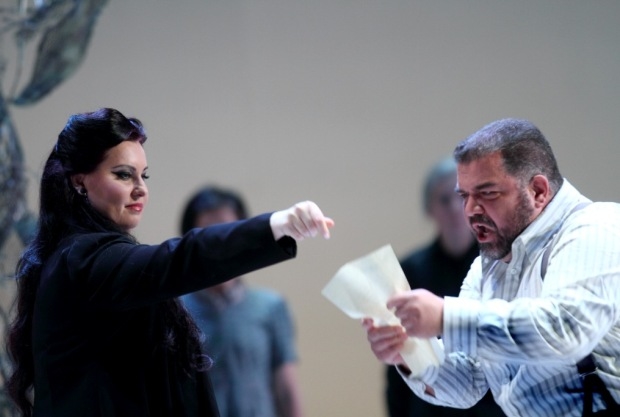Nabucco (Royal Opera House)

© Catherine Ashmore
I never expected to see this Nabucco again after 2013, and it can only be the pulling power of Plácido Domingo that’s prevented the Royal Opera from giving Daniele Abbado‘s dismal production the bum’s rush.
In this day and age it’s an affront to drama when singers troop on, face out and sing at the audience. A good semi-staged opera can offer more, as witness the ongoing Opera North Ring cycle. Yet even this would be tolerable if it enabled Abbado to tell his story with clarity; however, the identikit, refugee-by-numbers costumes make it impossible to decide who’s Hebrew and who’s Babylonian without resorting to some diligent homework.
Verdi’s first great popular success, Nabucco might easily have been called Abigaille; for it is she, the eponymous king’s supposed elder daughter, who has the pivotal role. As written, though, her vindictiveness towards her sister Fenena is one-dimensional, whereas the ageing king has Lear-like qualities that make him the more interesting subject even if he is something of a guest star in his own opera.
What the title character affords is a golden role for a Verdi baritone, which is why Dimitri Platanias (who shares this revival with Domingo) is the one to hear. The Greek singer is fast establishing himself as the most exciting exponent of this repertoire working today, and he doesn’t disappoint. Whether sane or crazed, imperious or broken, his Nabucco is sung with the kind of warm, mellow power, evenly distributed across his range, that makes you want to revoke the man's passport and chain him to our shores.
'The Royal Opera Chorus knocks us flat'
It’s a treat, too, to hear the 2013 Cardiff Singer of the World, the American mezzo Jamie Barton, sounding refulgent as Fenena, while tenor Leonardo Capalbo and bass John Relyea top and tail the male range in style as the Hebrews Ismaele and Zaccaria.
Matters are trickier when it comes to the Ukrainian dramatic soprano Liudmyla Monastyrska, in Domingo's absence the only returning soloist from first time round. Her Abigaille has some ravishing passages of sustained high-lying lyricism but the low register seems to have developed an ugly tonal lurch since she last sang the role. Worse, I’d defy anyone to decipher what she’s singing. My own Italian may not be up to much but at least it sounds vaguely like a language, not a gurgle.
It takes the Royal Opera Chorus, majestic in chorus master Renato Balsadonna‘s final season at the helm, to knock us flat with choral tableaux that include a thrilling account of the great lament "Va pensiero".
Maurizio Benini conducts a workaday account of the score. He’s a regular journeyman at Covent Garden but not an especially inspiring figurehead, and a few of the opera’s set pieces feel glossed over. The maestro does little to help Verdi’s pageant-like drama transcend the shackles of Abbado’s grey production and Alison Chitty‘s even greyer designs. (I noticed a few small adjustments to the staging since last time, but not nearly enough. Only wholesale intervention could save it.) Vocally, though, it’s still a rousing evening.
If you plan on attending Nabucco in order to hear Platanias at the top of his game, please note that he is scheduled to sing at all the remaining performances except 23 June, which is Domingo’s last.
Nabucco continues in repertory at the Royal Opera House until 30 June.










